- Home
- William Bell
Stones Page 13
Stones Read online
Page 13
“I have.”
“And?”
She nodded. Once. We stood looking at one another for a moment. I realized I was wasting my time.
“Well, I just wanted to introduce myself,” I said. “Goodbye. Sorry to bother you.”
I turned to leave, had my hand on the doorknob, but spun around instead of opening the door. She hadn’t moved.
“What is it with you, anyway?” I almost shouted. “What’s wrong with me that I’m not good enough for her?”
Ms. Skye shook her head. “That’s not it. You wouldn’t understand.”
“That’s incredibly condescending,” I snapped. “And bigoted if you ask me —”
“I didn’t ask you,” she cut in, her tone as calm as before. Nothing makes me angrier than when I’m mad and someone talks to me as if she’s describing how to wash a pot.
“This isn’t about you personally,” she added.
“Look, Ms. Skye, if this isn’t personal, nothing is.”
“It isn’t anything to do with you,” she repeated, adding dismissively, “Now, if there’s nothing more I can do for you …”
“I’m sorry I wasted your time,” I muttered, dying to say more. I turned away and quietly closed the door behind me.
chapter
If I expected Raphaella to fall into a rage when she found out I’d gone to see her mother — somehow I knew Ms. Skye wouldn’t pass up a chance to make me look bad — I had misjudged her there, too. Icy calm was her response. I phoned repeatedly, and each time her mother would say in a flat, almost bored tone, “She doesn’t want to talk to you.”
“How do you know she doesn’t?”
And she would hang up.
I drove over to the house half a dozen times, rang the doorbell, whacked the knocker. No answer. I went to the store, and Ms. Skye said triumphantly, “You come back and I’ll slap a restraining order on you.”
A few days later a note came in the mail. “Please don’t contact me again,” and it was signed, “R. Skye.”
A week passed. I sank into a swamp of guilt and despair. One minute I’d be seized by anger. What, after all, had been my big crime? The next moment I hated myself for what I had done, not just the stupidity, but my betrayal. Raphaella had trusted me, had placed faith in my promise, and I had sneaked around behind her back like a tenth-rate private detective, all because some half-drunk airhead had passed on a bit of malicious gossip.
I wrote a letter to Raphaella, trying to explain myself, asking her to forgive me, but it came back unopened. I stood across the street from the Demeter store, ignoring Ms. Skye’s threat, hoping to see Raphaella. No luck.
Another week passed.
My parents steered clear of me after the first time Mom innocently asked, “Where’s Raphaella these days?” and I almost bit her head off. Every day I’d go to the shop and work on the Maitland restorations, trying to lose myself in my work, often staying past closing time. But a lot of the time I’d think about that first day when Raphaella had sat in the chair and I had worked on the slat for the baby crib while we talked.
When I got home, unless it was raining, I’d go for a long run along the lakefront, avoiding Tudhope Park. I sought to tire myself, hoping I could fall asleep easily. I tried to pass my free time reading, but I couldn’t concentrate. Food didn’t interest me. Nothing did.
Another week passed.
I knew then that I had lost her. For good.
As I worked in the shop, I wondered if I could ever get used to living without her, if I could fill the empty space inside me. And that was when I started to think about Hannah, her grief at losing Jubal. And I began to talk to Hannah inside my head. I lost someone, too, I’d say, but it was my own fault. I wish I could figure out a way to get her back.
Then it dawned on me that there was something I could do for Hannah. It wasn’t a completely selfless thought. If I could help her, maybe I wouldn’t feel so worthless.
2
“Dad, we’ve got some seasoned oak planks out back. Do you mind if I use some for a personal project?”
My father looked up from the ledger that lay open on the office desk. He searched my face. He and Mom had been treating me like an invalid lately, wondering what was going on and only halfway to an answer when Raphaella had dropped out of the picture.
“Hey, you don’t have to ask. You know that. Back there,” he pointed at the shop door, “you’re in charge. What’s the project?”
“Oh, nothing really.”
“Sounds interesting,” he said.
3
My first step was a visit to Ontario Provincial Police headquarters on Memorial Avenue, a huge complex that looked like a cross between an airplane hangar and a factory. I talked with the director of the forensic division. I told him I needed some information for a school project and he was very helpful. It was only after I’d left that I remembered school had been out for a couple of weeks.
Next, I selected two one-by-six boards, lined them up on the pipe clamps so their grains ran opposite to one another, glued the edges and tightened the clamps. When the glue dried, I’d have a twelve-inch plank. I left the wood for a couple of days before removing the clamps and cutting a number of lengths from the plank. I took four pieces and glued and clamped two sets of two for the top and bottom of the box I was making. The pieces that would form the sides I routed along both sides, then cut the dovetails into the ends. They would ensure strong and lasting corners. More gluing and clamping, along with careful use of the square, produced a bottomless and topless box.
The next day I spread glue on the touching surfaces, fitted the bottom and fixed it in place with brass screws. I drilled and countersunk holes in the top, which would not be permanently attached until later, then prepared the wood for the finish, sanding it within an inch of its life, making it as smooth as glass.
I selected a natural oak stain-sealer and applied it by hand with a rag, rubbing it in, making sure the color was even. I set it aside to dry.
Over the next week I applied a coat of plastic finish each morning after lightly sanding the previous day’s job, until I had a deep matte finish on the box, so clear I could see my face in it.
I was testing the top for fit one last time when I heard Dad calling from the showroom.
“Garnet! Someone here to see you.”
“Send ‘em back,” I answered.
I sank my fingers into a tin of hand cleaner and began to work the cream into my hands, dissolving dirt and stain. The stuff had an awful smell, but it did the job. A few paper towels removed the cream from my hands. I went to the sink to wash with soap and water. My back was to the door. When I looked up, Raphaella was standing there.
She was wearing a canary-yellow T-shirt, white shorts and leather thong sandals. Her hair was loosely held at the back of her neck. Against her tanned skin her birthmark seemed faded, subdued.
My heart practically leapt from my chest. I made myself remain calm. Maybe she was here for something that had nothing to do with her and me, I cautioned myself. Maybe she was working on another show and wanted to borrow more antiques or something. I stood there in my stained apron, wiping my hands on a ratty face towel, afraid to speak.
She came to me and put her arms around my neck. My eyes stung. I hugged her tightly, as if I were drowning.
“I missed you,” I whispered, almost crying. “I broke my promise. I’m sorry.”
“I missed you, too,” she answered. I felt her tears on my neck. “I was mad at you, hurt. But I broke my promise, too. Remember that day in the park? I said you wouldn’t lose me.”
I didn’t deserve her forgiveness, but I said nothing.
“I expected too much of you,” she whispered. We stood like that for a while, until Dad came to the door.
“Oopsy-daisy,” he said, spinning on his heel and disappearing.
Raphaella dropped her arms, wiped her eyes with the backs of her hands. “‘Oopsy-daisy’?” she said.
“Yesterday he calle
d me Daddy-o.”
She laughed.
We stood there like two losers on a blind date. Then Raphaella’s eyes fell on the oak box.
“That’s a beautiful finish,” she said. “What’s the box for?”
“Well, you’re going to think I’m crazy,” I replied. I told her what I had in mind.
“I want to help,” she said.
“We’re going to need money and a lot of equipment.”
“Okay.”
“I love you,” I said.
“I know you do. I never doubted it.”
“Uh-huh. And?”
“And what?”
“This is the part where you say, ‘I love you, too.’ You forgot.”
“Oopsy-daisy,” she said.
chapter
I had planned it carefully — and secretly.
One thing was on our side: we had all the time we needed. We assembled a collection of gear that almost filled the van. A large tent, plastic tarpaulins, leather gloves, pails, flashlights, lanterns, garden trowels, paint brushes, a couple of metal flour sifters. What I couldn’t scrounge, I bought.
I wanted to move the equipment in at night because the plan was illegal. Once we were set up we’d be out of sight and we’d be able to work in daylight. I parked the van off the side of the road by the stone monument. I helped Raphaella struggle into her backpack harness and shouldered my own pack. Moonlight bathed the graveyard, but when we entered the maple forest we had to use our flashlights.
It took us three trips to get all the gear to the clearing. By then it was close to midnight. We left quickly, having no desire to meet Hannah on her nightly walk.
The next day we prepared the site, growing accustomed to the chill as we worked. We cut and raked away the grass and weeds that grew inside the ruins of the cabin. Afterwards, we pitched a family-sized tent over the area. Once we had cut away the nylon floor of the tent, we had a weatherproof area. Setting to work with spades, we skimmed off the turf from the ground, the matted roots fighting us every step of the way, and hauled the chunks of sod outside. After a full afternoon of panting and sweating, we had cleared the floor of the tent — once the floor of Hannah’s cabin — down to black earth.
“Do you think we’ll have to go very deep?” Raphaella asked, wiping her dirt-smudged brow with a hanky. Black soil was caked under her fingernails and ground into the skin of her hands.
“I doubt it.”
“Should we make a grid with string, the way the arch-eologists do?”
“No,” I said, looking around, “not necessary.”
“That was a joke, Garnet. Lighten up.”
Tired and sore, we called it a day.
2
The next morning, we were back, just after sunup, well supplied with coffee, juice, sandwiches and chocolate bars.
“We don’t want to be in the middle of things when night falls,” I said.
Once inside the tent, with the little portable radio playing, we began. I scratched a line down the center of the dirt floor, and we each worked away from the line to the opposite wall.
Digging with a garden trowel was tedious and exacting. We put the dirt into plastic buckets and emptied them outside the tent. We took a break for lunch, sitting outside in the clear air, glad to see sunlight after hours bent over inside the gloom of the tent, but wearing sweaters because, despite the weather reports on the radio that reminded us it was 28 degrees Celsius that day, the clearing was chilly.
We watched, fascinated, as squirrels and birds would approach the clearing and then, as if they’d hit an invisible force field, veer away. As we ate and talked, clouds moved in from the southwest, and by the time we got back to work, the sun was obscured. Occasionally, the radio crackled. There must have been lightning somewhere.
As the afternoon wore on, the cool air became more humid in the dimly lit tent. We painstakingly dug and scraped, filling buckets, emptying them, filling them once more, over and over, until we fell into a kind of trance.
I was outside, dumping a pail of dirt beside the pile of sod we’d made the day before, stretching the kinks out of my aching back, looking up at a sky that promised rain, when the music coming from the radio inside the tent suddenly stopped.
“Garnet, you’d better come in here,” I heard.
Raphaella was on her knees in the two-foot depression we had dug, brushing at something with a small paintbrush.
“Hold the light closer,” she said. “I think I’ve found something.”
My eyes locked on the curved, brownish-grey shape that winked in and out of sight as Raphaella plied the brush. Carefully scraping away dirt with a kitchen knife, then whisking it aside, scraping again and brushing, she slowly uncovered the round outline of a cranium.
“How can we be sure it’s Hannah?” Raphaella asked.
“It must be.”
I realized we were whispering.
“Wait.” Raphaella used the knife again, this time beside the skull, and prised from the dirt a black cameo.
“That’s it,” I blurted. “I saw it in my dream. That’s all the proof we need.”
3
Both of us were energized by the discovery. Not being an archeologist, I wasn’t sure what the best procedure would be. We had to make sure we got everything; we couldn’t leave a foot bone or a finger end behind. The job had to be complete.
“I think we should uncover all of her, leaving each bone in place, before we move anything. What do you think?” I asked Raphaella.
“That seems best. If we take out one bone at a time we might overlook something.”
“And,” I reminded her, “we have to be done before midnight.”
I could see her throat work when she gulped. She shuddered.
“Right. Why don’t you get started, and I’ll go back to the van. We’re out of juice, and I’m thirsty.”
“Good idea.”
It was a muggy evening, humid and still, and a few mosquitoes hummed their irritating little one-note tune inside the tent. I lit a mosquito coil in one corner and went back to work.
I began to dig with the trowel, feeling like an expert now as I quickly but carefully removed dirt from around the skull, then worked my way down the vertebrae. I had uncovered a shoulder and upper arm when I heard footsteps rapidly nearing the tent. The flaps were swept aside and Raphaella stooped to get inside. She was panting.
“What’s wrong?” I asked her.
She fell to her knees and dropped a plastic supermarket bag beside the dug-out area. I heard cans knock together.
“I think those men are in the woods somewhere.” She picked up her trowel and began to scrape in the dirt.
“Where did you see them?”
“I didn’t. I sensed them.”
“Uh-oh.” A cold blade slid though my ribs.
We pressed on. The excavation wasn’t difficult, because the earth was loamy, but it took time. We could have dug up the area with shovels and sifted the earth, like miners, but that seemed disrespectful.
“Do you feel it, too?” Raphaella said after a while.
“Yeah. They’re out there, all right. But we’re almost done.”
When we had uncovered the entire skeleton, we sat in the dirt for a moment and looked at Hannah’s remains. Her killers had buried her in the fetal position. Her legs were crossed at the ankles, her head rested on one hand. She looked almost peaceful.
But every major bone in her body — arms, legs, skull, four ribs, her pelvis — was broken.
“My god,” Raphaella moaned, “look what they did to her.”
chapter
Reverently, careful to leave nothing behind, we placed Hannah’s remains in the oaken box I had made, kneeling beside her in the dirt as we worked. I cleaned the pendant, rubbing it with a rag until it glowed. It was made of some charcoal-colored stone, not wood as I had first thought.
“I think Hannah would have liked you,” I said. “I’ll bet she’d want you to have this.”
“We’v
e got a lot in common, I guess,” she replied, “but the pendant should stay with her.”
“Okay, if that’s —”
The voices interrupted me, that same angry background rumble, all talking at the same time, as if in dispute.
Raphaella moaned. “They’re here.”
I laid the pendant in the box and put on the lid, using brass screws to secure it, fumbling with trembling hands.
“Done,” I squeaked nervously. “Let’s get out of here.”
“I don’t think they can hurt us physically,” Raphaella assured me, but she didn’t sound very confident.
I recalled the pockmarks on the back of the trailer, but said nothing.
When we emerged from the tent, it was twilight, and the smell of rain was in the air. The eight men were lined up along the fencerow, glaring in our direction, as if waiting for us. I saw them and saw through them. They were shades, but they were as frightening as any mob of real men, rough and strong looking in homespun shirts and worn overalls and heavy boots. They stood, silent now, and stared, not at me or the box that I held in my two hands, but at Raphaella.
“Stones,” someone whispered.
The wave of terror that struck me was almost physical. One of the men slowly lifted a stone from the wall.
“Get stones,” he said. One after another, the men obeyed.
“Raphaella, run!”
Raphaella sprinted toward the path and I turned to follow. A stone struck my elbow, knocking the box from my grip. I stooped to pick it up, hunching my shoulders, when another rock slammed into my back. I dashed into the trees, more stones thumping to the ground behind me.
It was awkward, running with a pack on my back and my hands full, and I knew I was moving too slowly to stay ahead of them for long. I pushed on, stumbling, my breath like fire in my chest. Where the land began to slope, the men caught up to me. The acrid stink of their sweat and the damp cold that seeped from them enveloped me. Oh, god, I thought, awaiting the crash of a rock on my skull. But they thundered past me, like a river flowing around a boulder. Panting and cursing, they left me in their wake, closing on Raphaella. She ran on, hair flowing behind her.

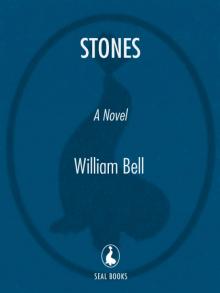 Stones
Stones Fanatics
Fanatics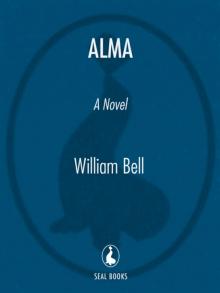 Alma
Alma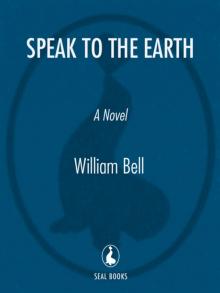 Speak to the Earth
Speak to the Earth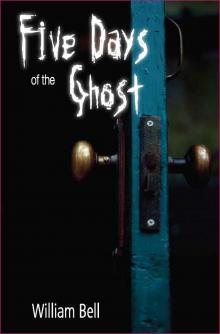 Five Days of the Ghost
Five Days of the Ghost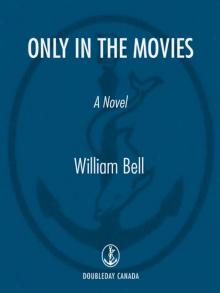 Only in the Movies
Only in the Movies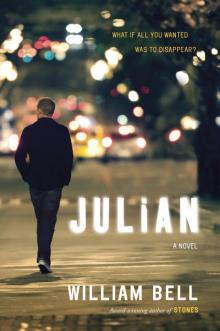 Julian
Julian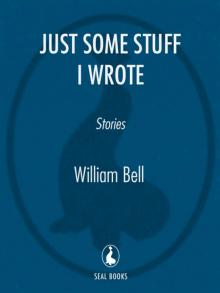 Just Some Stuff I Wrote
Just Some Stuff I Wrote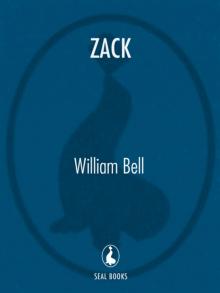 Zack
Zack Forbidden City
Forbidden City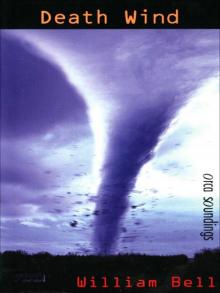 Death Wind
Death Wind No Signature
No Signature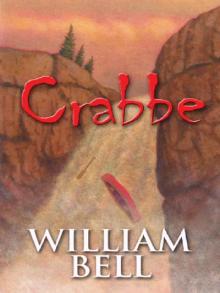 Crabbe
Crabbe